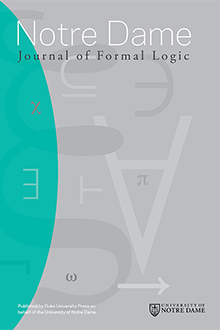Abstract
From 1929 through 1944, Wittgenstein endeavors to clarify mathematical meaningfulness by showing how (algorithmically decidable) mathematical propositions, which lack contingent "sense," have mathematical sense in contrast to all infinitistic "mathematical" expressions. In the middle period (1929-34), Wittgenstein adopts strong formalism and argues that mathematical calculi are formal inventions in which meaningfulness and "truth" are entirely intrasystemic and epistemological affairs. In his later period (1937-44), Wittgenstein resolves the conflict between his intermediate strong formalism and his criticism of set theory by requiring that a mathematical calculus (vs. a "sign-game") must have an extrasystemic, real world application, thereby returning to the weak formalism of the Tractatus.
Citation
Victor Rodych. "Wittgenstein on Mathematical Meaningfulness, Decidability, and Application." Notre Dame J. Formal Logic 38 (2) 195 - 224, Spring 1997. https://doi.org/10.1305/ndjfl/1039724887
Information





